Difference between revisions of "Ralang Monastery"
m (1 revision: link) |
|||
| Line 14: | Line 14: | ||
[[Category:Buddhist Terms]] | [[Category:Buddhist Terms]] | ||
[[Category:Karma Kagyu]] | [[Category:Karma Kagyu]] | ||
| − | |||
| − | |||
Revision as of 15:29, 5 July 2013
Ralang Monastery is a Buddhist Monastery of the Kagyu sect of Tibetan Buddhism in southern Sikkim, northeastern India. It is located six kilometres from Ravangla.
According to legend, Ralang was built after the fourth Chogyal came back from his Pilgrimage, when the 9th Karmapa performed the Rabney (Blessing). He threw grains from his residence in Tsurphu Monastery In Tibet and where the grains fell, eventually, became the site for the Ralang Monastery.
The Monastery underwent reconstruction in 1975-1981 and in 1995, a new Monastery, known as Palchen Choeling Monastic Institute was built by the 12th Gyaltsab Rinpoche, which retained its Tibetan architecture.
Ralang Monastery has an extensive collection of paintings and thangkas and is host to an annual festival, known as Pang Lhabsol when Mount Kangchenjunga is worshipped usually in September and ending in early December with the Kagyed. Chaam masked dances are also organized every year, on the 15th day of the seventh month of the Buddhist Calendar (August-September) and on the 29th day of the tenth month of the Buddhist Calendar (December). The Mahakala Dance takes place every year in the month of November.
